Imagine that when you hire a new sales representative, instead of training them for weeks manually, you can utilize a powerful system that brings them up to speed in no time. This is precisely the function of sales onboarding software.
In 2025, companies cannot allow themselves to spend time on obsolete training methods. With the correct tools, even beginners can become revenue-generating professionals in record time. Whether you’re a large corporation or a startup, possessing the finest sales onboarding tools can transform the game.
What Is Sales Onboarding Software?
Sales onboarding software acts as a personal trainer for new sales representatives, helping them master the basics, gain skills with your products, and quickly start closing sales.
New employees benefit from an interactive and organized learning experience, rather than facing the burden of lengthy manuals and tedious training sessions.
To get representatives ramped up to full sales productivity in 90 days, managers and sales executives must create strategies with milestones.
These platforms provide training modules, role-playing exercises, quizzes, and real-life scenarios to guarantee that reps comprehend not only what to sell but also how to sell it effectively.
Top-notch sales onboarding platforms track progress, offer analytics, and ensure that all team members receive uniform training of the highest quality. In short, they eliminate the disorder associated with onboarding, substituting it for a streamlined, automated procedure that enhances efficiency and saves time.
Experts like HubSpot’s Training Manager, Lisa Gledhill, emphasize that modern onboarding tools provide a more engaging and results-driven approach, ensuring that new hires are equipped with the right tools from day one.
10 Best Sales Onboarding Tools for Sales Teams
When it comes to onboarding new sales reps, choosing the right tool can make all the difference. The best sales onboarding tools streamline training, engage reps, and help you track their progress efficiently. Below are 10 of the best sales onboarding tools available in 2025, complete with their top features, user ratings, pros and cons, and best-suited use cases.
Disclaimer:
After extensive research and analysis, we have curated a list of the best sales onboarding software. The services were evaluated based on factors such as pricing flexibility, feature comprehensiveness, ease of use, customer support quality, and overall value for businesses of different sizes, from Capterra, G2, and GetApp. We aim to assist businesses in identifying the most suitable tool to simplify their operations.
1. Mindtickle
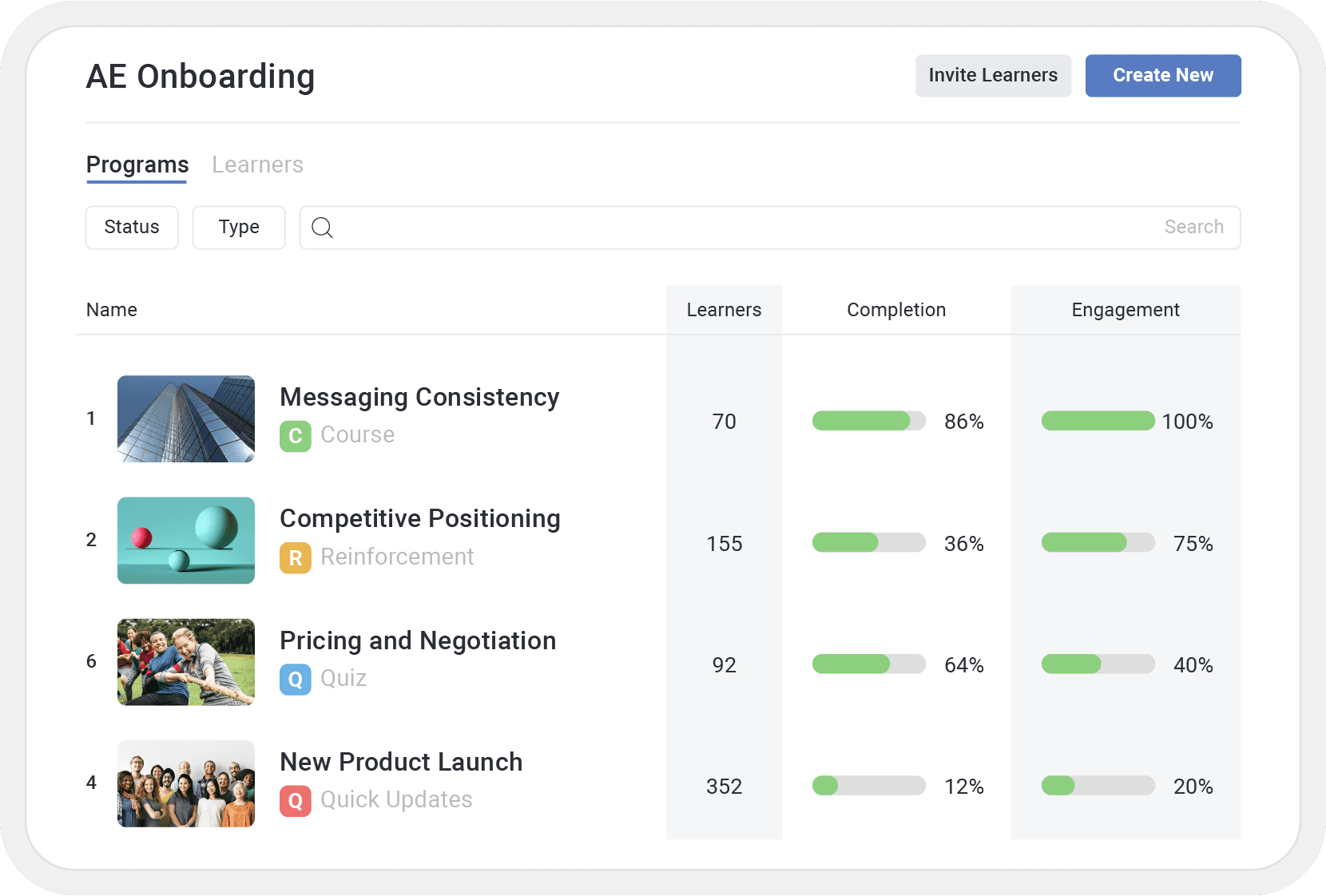
Mindtickle is a leading sales enablement and onboarding platform designed to improve sales team performance through data-driven coaching and structured learning. It helps organizations enhance sales readiness by offering engaging training modules and skill development programs.
With a focus on continuous learning, Mindtickle ensures that sales representatives stay prepared, confident, and equipped to drive better results.
Mindtickle has been recognized by Gartner as a leader in sales training technology for the past three years, underlining its authority in the industry.
G2 Rating: 4.6/5
Top Features
- Sales enablement
- Interactive onboarding programs
- Knowledge base management
- Personalized learning paths
Pros
- Offers in-depth coaching, onboarding, and reinforcement for sales teams.
- Uses analytics to assess skill gaps and improve sales performance.
- Keeps users motivated with quizzes, leaderboards, and rewards.
Cons
- Requires time for users to fully utilize its advanced features.
- Customizing training paths and reports can be challenging.
Best-Suited Use Cases
Ideal for medium to large enterprises looking to create customized, engaging sales training experiences. Particularly useful for teams needing detailed analytics and performance tracking.
2. Allego
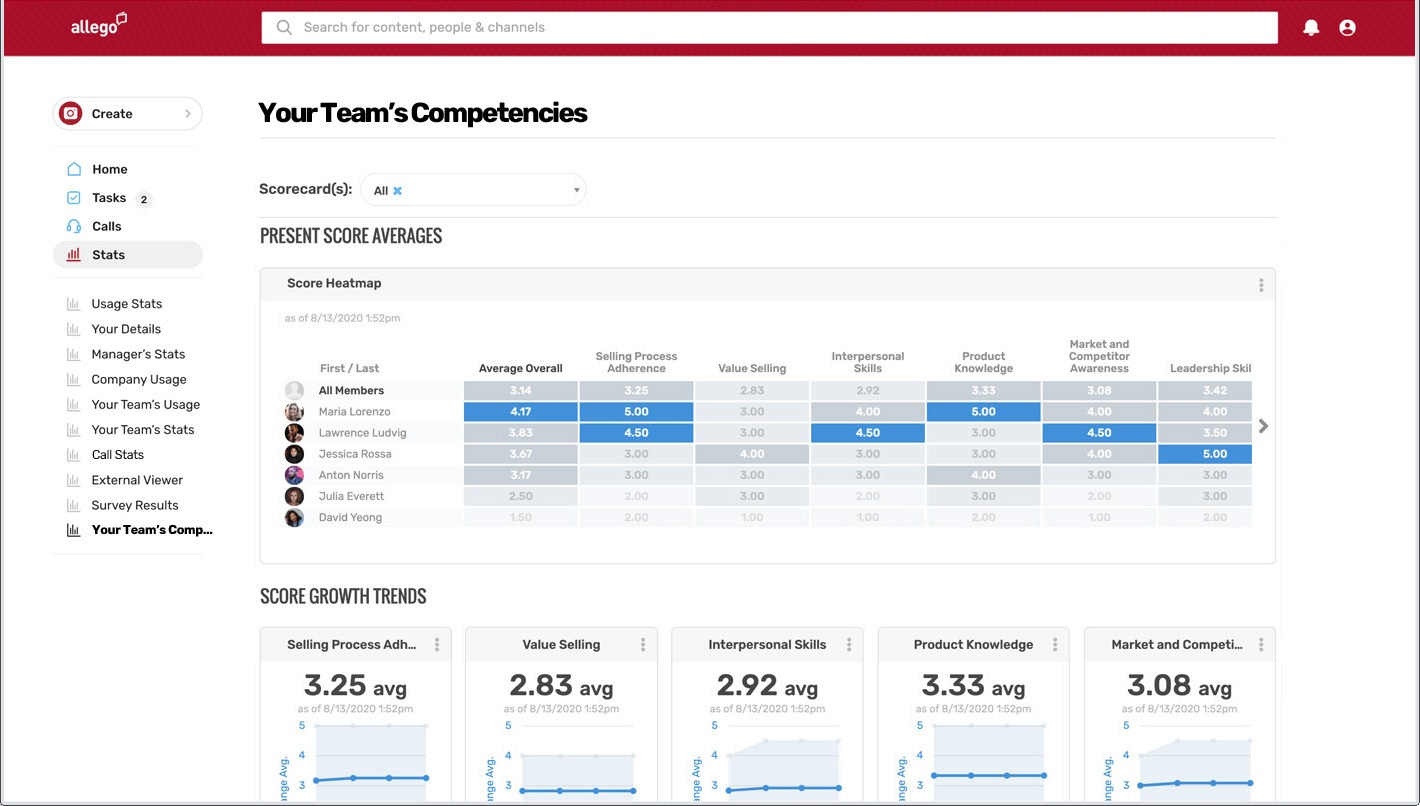
Allego is a sales enablement platform that enhances training, collaboration, and content management for sales teams. It focuses on modern learning techniques, including video-based coaching and peer-to-peer knowledge sharing.
By integrating learning into daily workflows, Allego helps sales professionals refine their skills, improve engagement, and stay up to date with the latest industry insights and best practices.
G2 Rating: 4.5/5
Top Features
- Video-based learning
- Sales coaching tools
- Real-time feedback
- Sales training library
Pros
- Enables peer-to-peer video sharing for personalized coaching.
- Users can access training materials without an internet connection.
- Provides feedback and coaching recommendations based on performance.
Cons
- Not seamlessly connected with all external tools.
- Managers struggle with tracking engagement levels.
Best-Suited Use Cases
Best for sales teams focusing on improving communication skills and role-playing scenarios. Great for training teams with a mobile-first approach. Allego’s integration with platforms like Microsoft Teams and Slack helps sales teams easily adopt it without disrupting existing workflows, backed by customer reviews.
3. 360Learning
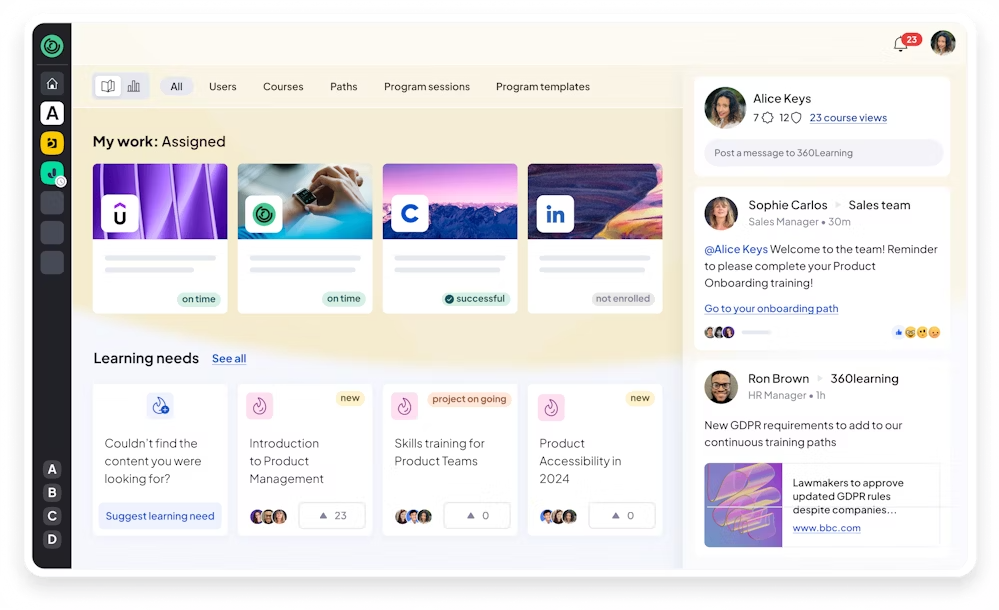
360Learning is a collaborative learning platform that empowers sales teams through peer-driven training and knowledge sharing. It enables organizations to create, distribute, and track learning programs that encourage engagement and continuous skill development.
With a focus on teamwork and real-world insights, 360Learning helps sales professionals stay agile, informed, and ready to succeed in a competitive market.
G2 Rating: 4.4/5
Top Features
- Collaborative learning
- Social learning features
- Onboarding workflows
- Course authoring tools
Pros
- Highly collaborative and social learning experience.
- Flexible course creation tools for trainers.
- Strong focus on peer-to-peer knowledge sharing.
Cons
- Lacks advanced testing options for deeper skill evaluation.
- Some features do not function optimally on mobile devices.
Best-Suited Use Cases
Best for teams that value collaborative, social learning environments and peer-led training. Perfect for organizations with a learning culture and a need for personalized courses.
4. Brainshark (Bigtincan)
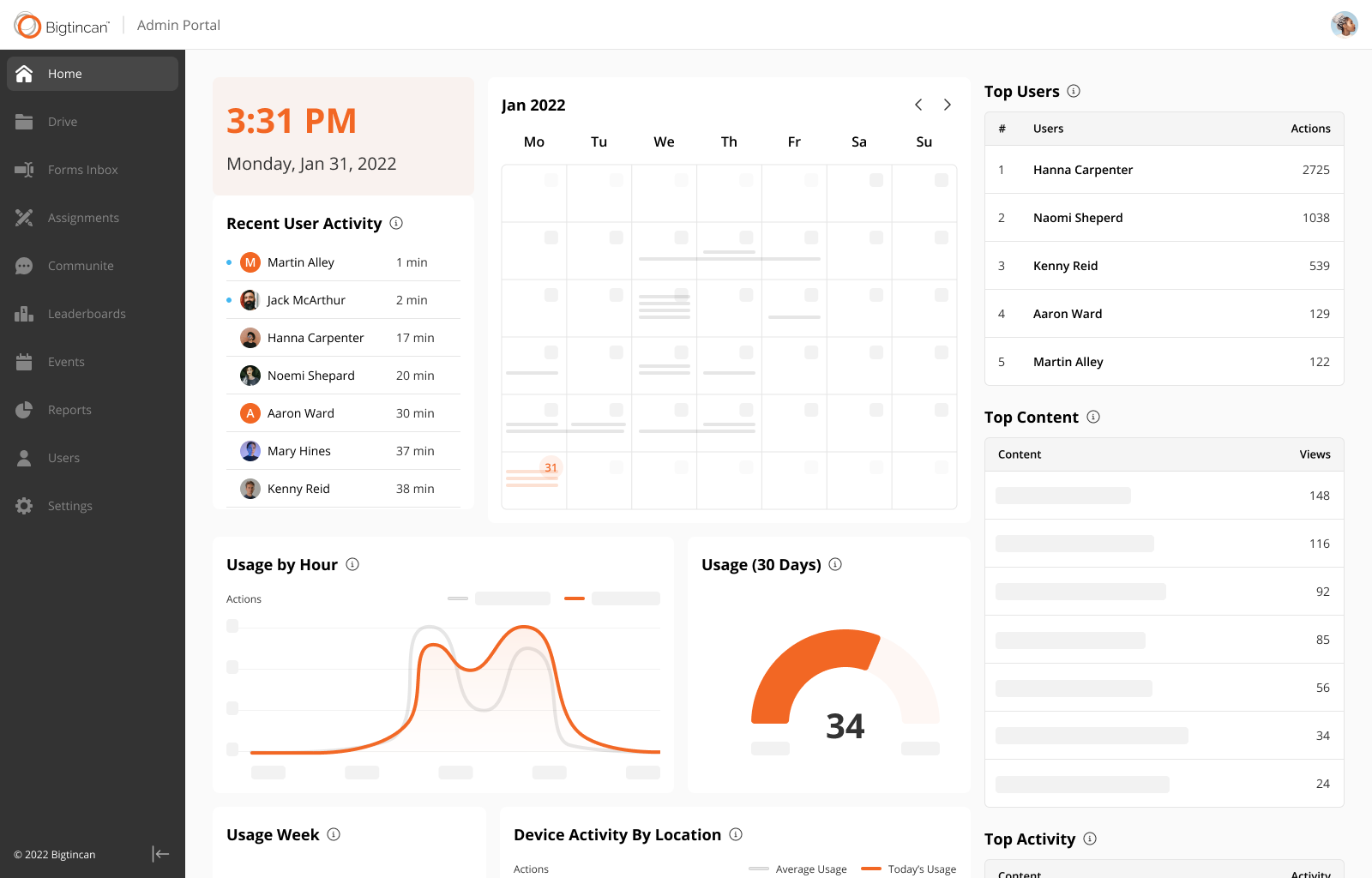
Brainshark, now part of Bigtincan, is a sales readiness platform designed to help sales teams improve performance through training, coaching, and content management. It enables organizations to deliver engaging learning experiences that enhance product knowledge and sales skills.
By focusing on continuous development, Brainshark ensures that sales representatives are well-prepared to engage prospects and close deals effectively.
G2 Rating: 4.2/5
Top Features
- Sales content management
- Video training and simulations
- Real-time performance tracking
- Learning path automation
Pros
- Provides coaching, assessments, and content for sales teams.
- Delivers detailed insights into training effectiveness.
- Supports slide-based and video content for engaging learning.
Cons
- Organizing and updating materials can be cumbersome.
- Needs regular content refreshes to stay relevant.
Best-Suited Use Cases
Ideal for sales teams looking to improve product knowledge and role-playing with realistic video simulations. Ideal for businesses needing strong content management and tracking systems.
5. WorkRamp

WorkRamp is an all-in-one learning platform designed to streamline sales onboarding and training. It helps organizations equip sales teams with the knowledge and skills needed to drive success through customized learning paths and interactive training.
By fostering continuous development, WorkRamp ensures that sales professionals stay confident, informed, and ready to perform at their best.
G2 Rating: 4.7/5
Top Features
- End-to-end sales training platform
- Learning paths and certifications
- Analytics and reporting
- Integration with CRM and other tools
Pros
- Supports employee, partner, and customer training.
- Allows businesses to create tailored training experiences.
- Enhances engagement with badges, points, and leaderboards.
Cons
- Pre-built reports may not meet all tracking needs.
- Copying and reusing courses is inefficient.
Best-Suited Use Cases
Ideal for mid-to-large teams that require a robust, scalable onboarding solution with full CRM integration. Excellent for businesses looking for a complete training and performance management platform.
6. TalentLMS
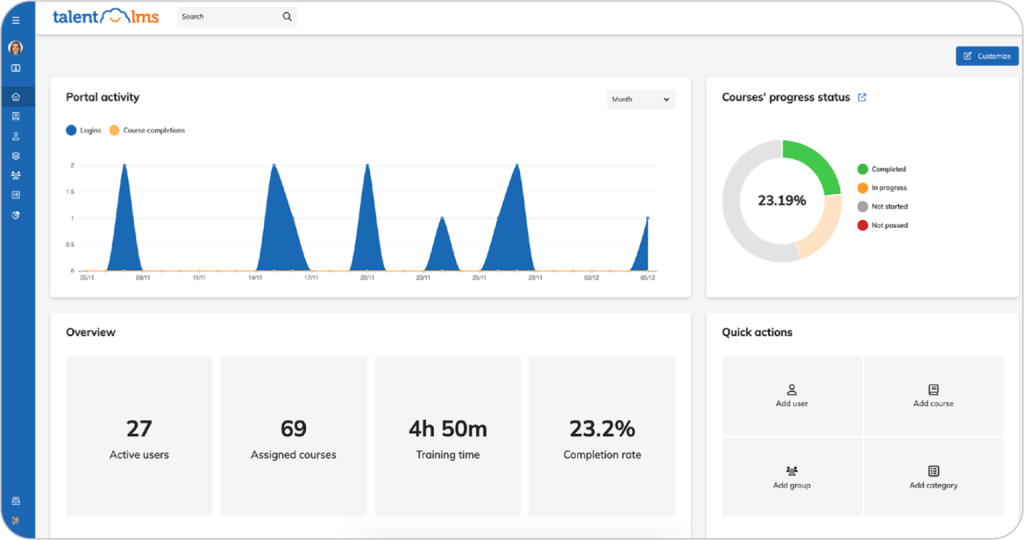
TalentLMS is a flexible and user-friendly learning management system designed to simplify sales onboarding and training. It enables organizations to create, manage, and deliver engaging learning experiences that help sales teams build essential skills.
With a focus on accessibility and ease of use, TalentLMS ensures that sales professionals can learn anytime, anywhere, and stay prepared for success.
G2 Rating: 4.5/5
Top Features
- Cloud-based learning management system
- Customizable courses and assessments
- Sales reporting and analytics
- Multi-device accessibility
Pros
- Supports industry-standard e-learning formats.
- Combines self-paced, instructor-led, and video training.
- Streamlines course assignments and user progress tracking.
Cons
- Reporting tools do not offer deep insights for data-driven decisions.
- Some users find course-building options restrictive.
Best-Suited Use Cases
Perfect for small to mid-sized businesses looking for a user-friendly, scalable onboarding solution. Best for teams who prioritize ease of use and mobile accessibility.
7. Docebo
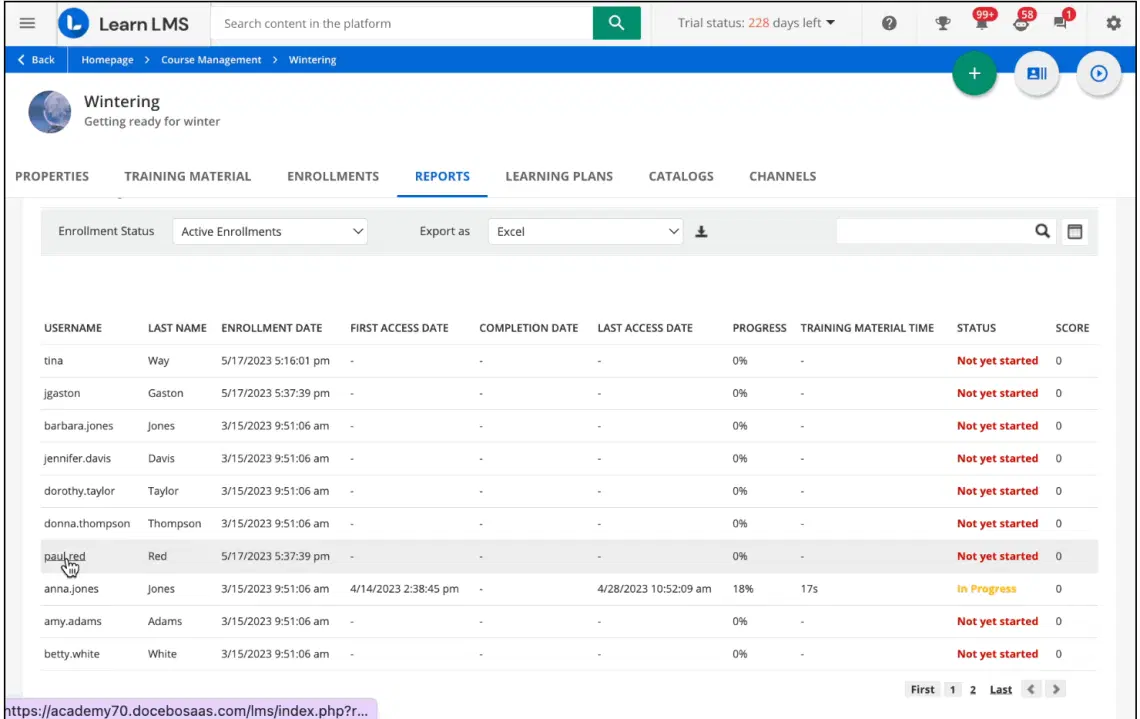
Docebo is a powerful AI-driven learning management system that enhances sales onboarding and training through personalized learning experiences. It helps organizations deliver scalable, engaging training programs that boost sales team performance.
By leveraging automation and advanced analytics, Docebo ensures that sales professionals continuously develop their skills, stay informed, and adapt to evolving market demands.
G2 Rating: 4.4/5
Top Features
- Social learning tools
- Mobile learning support
- Advanced analytics
- Personalized learning paths
Pros
- Recommends personalized content based on user behavior.
- Connects seamlessly with multiple business tools.
- Supports global training needs efficiently.
Cons
- Overwhelming for first-time users.
- Relies on third-party tools for content development.
Best-Suited Use Cases
Ideal for sales teams looking for a flexible, AI-driven platform that supports social learning and mobile access. Suitable for large-scale teams that need advanced analytics and personalized learning experiences.
8. Continu
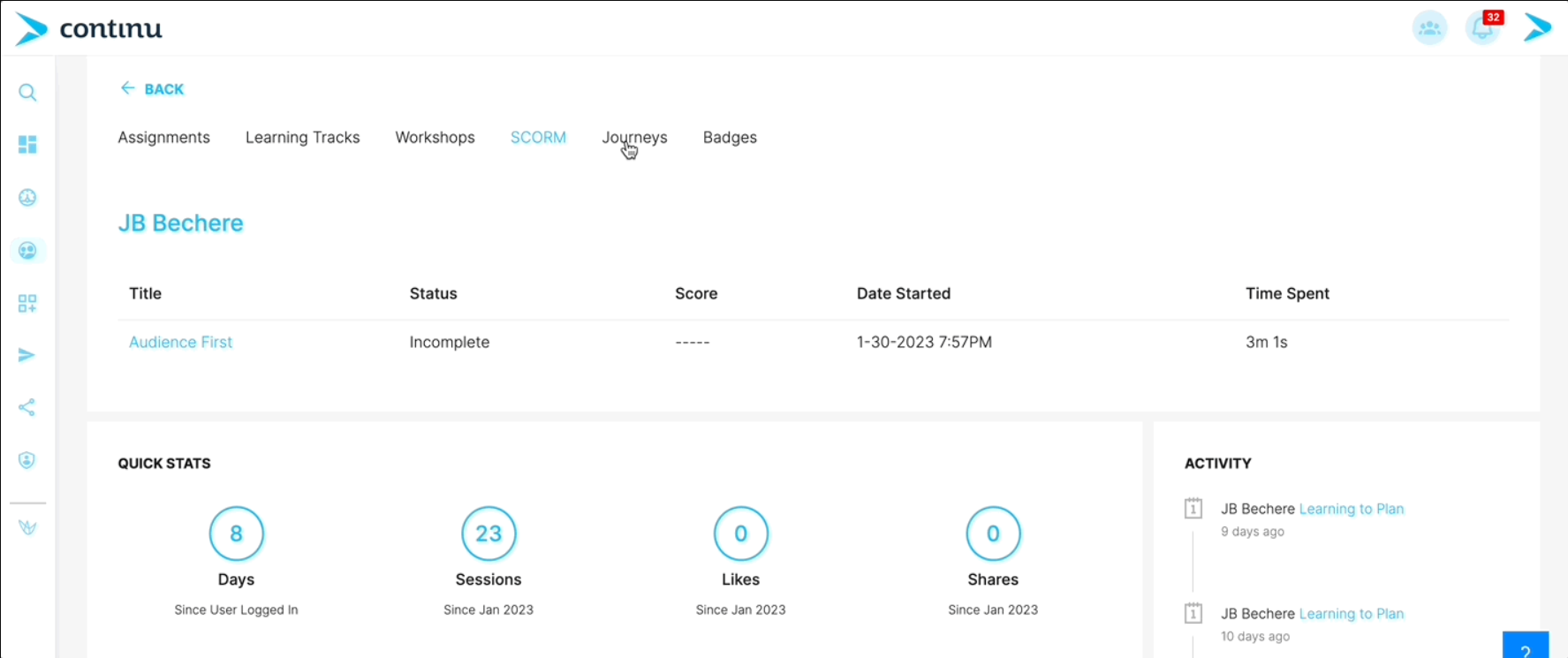
Continu is a modern learning platform designed to streamline sales onboarding and training through interactive and engaging learning experiences. It enables organizations to create, deliver, and track training programs that help sales teams build essential skills.
With a focus on seamless integration and adaptability, Continu ensures that sales professionals stay knowledgeable, confident, and ready to achieve their goals.
G2 Rating: 4.5/5
Top Features
- Customizable training programs
- Integration with popular tools (Salesforce, Slack)
- Video-based learning
- Analytics and progress tracking
Pros
- Enables easy distribution of training materials across teams.
- Supports interactive learning experiences like quizzes and discussions.
- Works well with CRMs, HR software, and communication platforms.
Cons
- Lacks advanced features for tracking compliance training.
- Fewer third-party resources compared to larger LMS platforms.
Best-Suited Use Cases
Best for companies with a diverse tech stack, needing a platform that integrates well with various tools. Ideal for teams that need personalized, video-based training.
9. Trivie
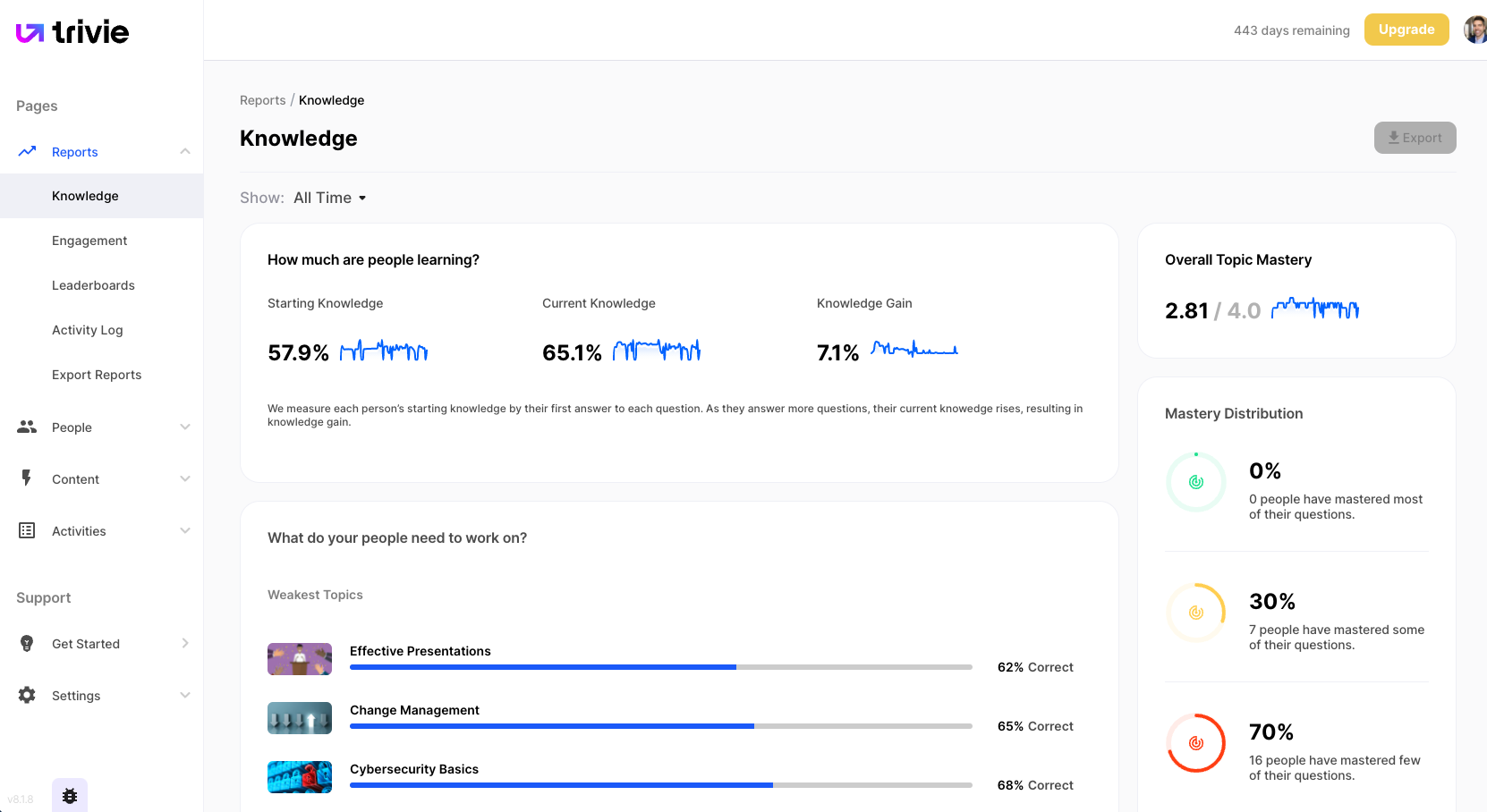
Trivie is a knowledge retention and training platform that helps sales teams reinforce learning through AI-driven assessments and gamification. It focuses on improving long-term knowledge retention by making training more engaging and interactive.
With data-driven insights and adaptive learning techniques, Trivie ensures that sales professionals stay informed, confident, and well-prepared to succeed in their roles.
G2 Rating: 4.3/5
Top Features
- Knowledge reinforcement
- Employee engagement features
- Personalized quizzes and assessments
- Data-driven insights
Pros
- Uses AI to reinforce knowledge with personalized quizzes.
- Incorporates spaced repetition for better retention.
- Ensures employees remember training over time.
Cons
- Focuses more on reinforcement than full-scale learning.
- Lacks in-depth content authoring tools.
Best-Suited Use Cases
Perfect for reinforcing sales knowledge through quizzes and assessments. Ideal for businesses focused on continuous learning and knowledge retention rather than initial training.
10. Wonderway
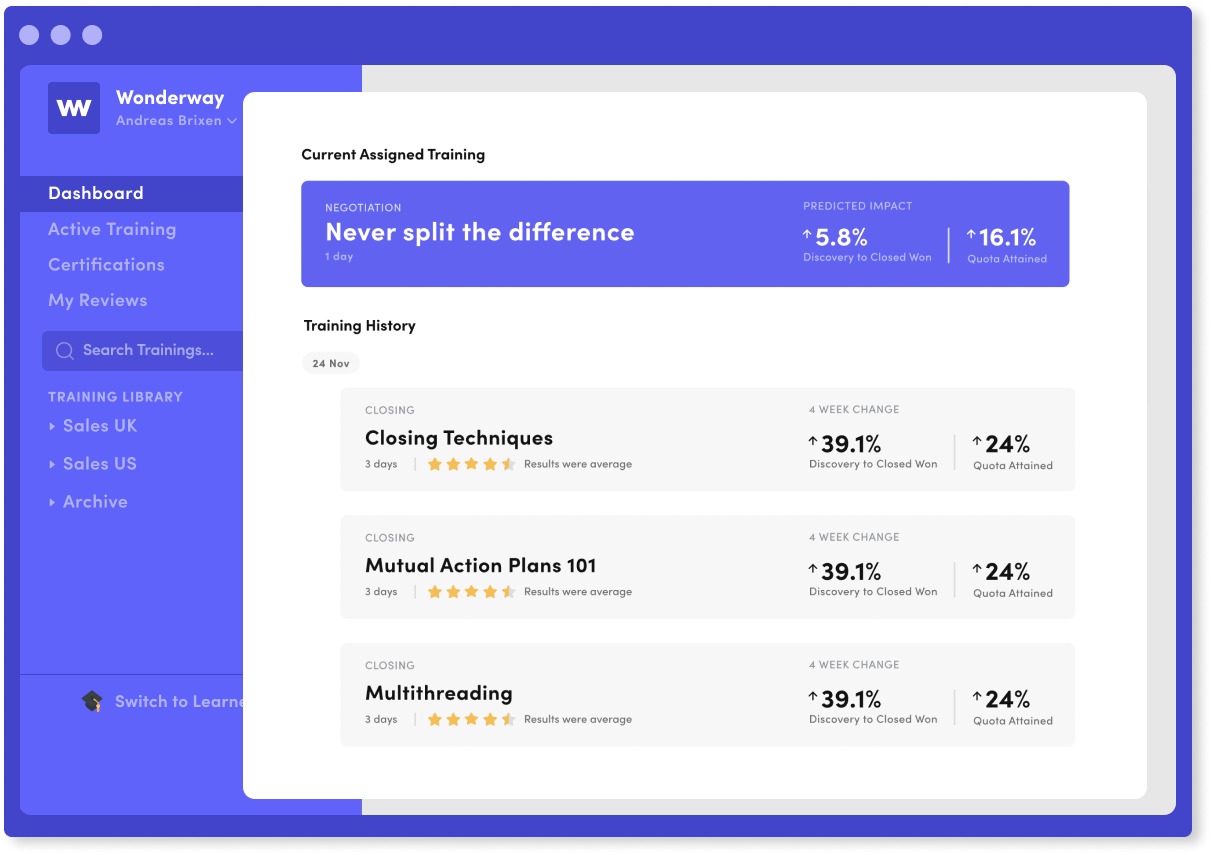
Wonderway is a sales onboarding and training platform designed to accelerate the ramp-up process for new sales representatives. It provides customized, interactive training experiences that help teams develop essential skills quickly.
After focusing on continuous learning and performance tracking, Wonderway ensures that sales professionals are always equipped with the knowledge they need to excel in a competitive environment.
G2 Rating: 4.6/5
Top Features
- Interactive training experiences
- Easy-to-use dashboard
- Real-time feedback and reporting
- Customizable content delivery
Pros
- Helps sales teams improve skills with targeted coaching.
- Suggests learning based on individual performance.
- Aligns courses with business objectives and KPIs.
Cons
- Not ideal for broader organizational training needs.
- Some users find training paths rigid.
Best-Suited Use Cases
Best for teams looking for a fun, engaging onboarding experience with customizable content. Great for small to medium-sized sales teams looking for real-time feedback and performance tracking.
Benefits of Using a Sales Onboarding Platform
Sales onboarding software is a personal trainer for your new sales team members.
Sales onboarding goes beyond simply instructing new hires; it aims to establish them for sustained success. Here’s how the appropriate software can transform the way you train your sales team.
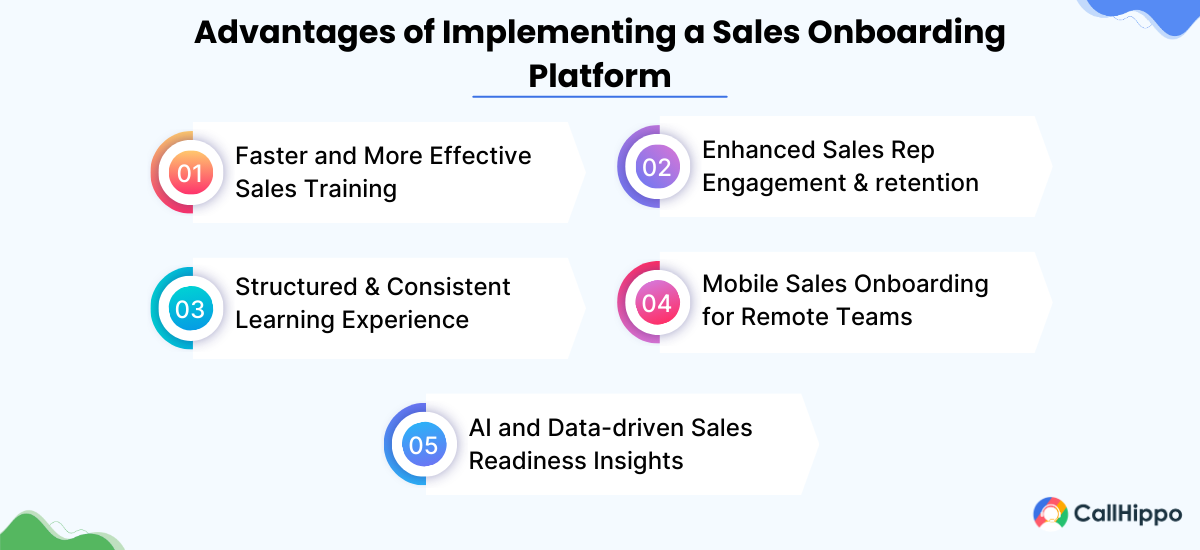
1. Faster and More Effective Sales Training
Training Conventional training approaches can require weeks or even months until a new sales representative is completely prepared to meet their targets. This process can be accelerated by sales onboarding software, which provides interactive and self-paced learning modules that representatives can complete effectively.
New employees can rehearse their sales presentations and deal with objections in a no-risk setting, thanks to features like video-based training, real-time quizzes, and virtual role-playing.
In addition to facilitating their learning process, this helps them gain confidence before engaging with actual customers. With automated tracking, managers can pinpoint areas where representatives require additional assistance, guaranteeing that everyone receives support.
2. Enhanced Sales Rep Engagement & retention
When sales teams feel motivated and connected to their work, they thrive. A major reason that sales representatives leave a company is the absence of adequate onboarding and ongoing development.
A sales onboarding platform that is well-designed makes training engaging and helps new employees feel appreciated from the very first day. By incorporating interactive content, gamification, and peer-based learning, a training environment is established that fosters active involvement from representatives.
3. Structured & Consistent Learning Experience
Inconsistency offers a great challenge in typical sales training. When different managers employ diverse training methods for representatives, it can result in knowledge gaps and disparities in performance. This issue is resolved by sales training and onboarding software, which standardizes the learning process.
These platforms offer a structured roadmap, assuring that every new employee receives the same high-quality training experience, irrespective of their location or trainer. The modules are intended to encompass all aspects, ranging from product knowledge and sales strategies to compliance and corporate values.
Uniformity in the training experience allows companies to guarantee that all sales representatives adhere to the same performance criteria. Using a consistent onboarding approach also bolsters a company’s branding and sales strategies, guaranteeing that customers have a seamless experience no matter which representative they engage with.
4. Mobile Sales Onboarding Software for Remote Teams
In the present hybrid and remote work environment, companies require flexible training solutions that assist employees regardless of their location. Mobile sales onboarding software revolutionizes the process, enabling reps to train at their convenience and location with their smartphones or tablets.
Reps can access training videos, sales scripts, and interactive lessons on the go with mobile-friendly learning modules. This is mostly beneficial for field sales teams who may not always be at their desks. Reps stay engaged and accountable for their learning through push notifications, micro-learning modules, and on-the-go assessments.
5. AI and Data-driven Sales Readiness Insights
One of the major benefits of contemporary sales onboarding tools is their capacity to utilize AI and analytics to improve training effectiveness. AI-driven platforms are capable of analyzing sales rep performance, forecasting knowledge gaps, and tailoring learning paths according to each individual’s progress.
For example, when a new employee has difficulty dealing with a particular sales objection, AI can suggest focused training modules to enhance that ability. Advanced reporting tools also offer managers data-driven insights into which representatives are excelling and which require additional support.
This guarantees that training is not just efficient but also perpetually refined for improved outcomes. Businesses can enhance their training strategies with AI-driven sales readiness insights, ensuring that every representative achieves peak performance more quickly and with increased assurance.
Key Features of Sales Training and Onboarding Software
The appropriate characteristics guarantee that sales representatives receive optimal training, all the while keeping managers updated on developments. Here are the essential features to seek in a high-quality onboarding tool.
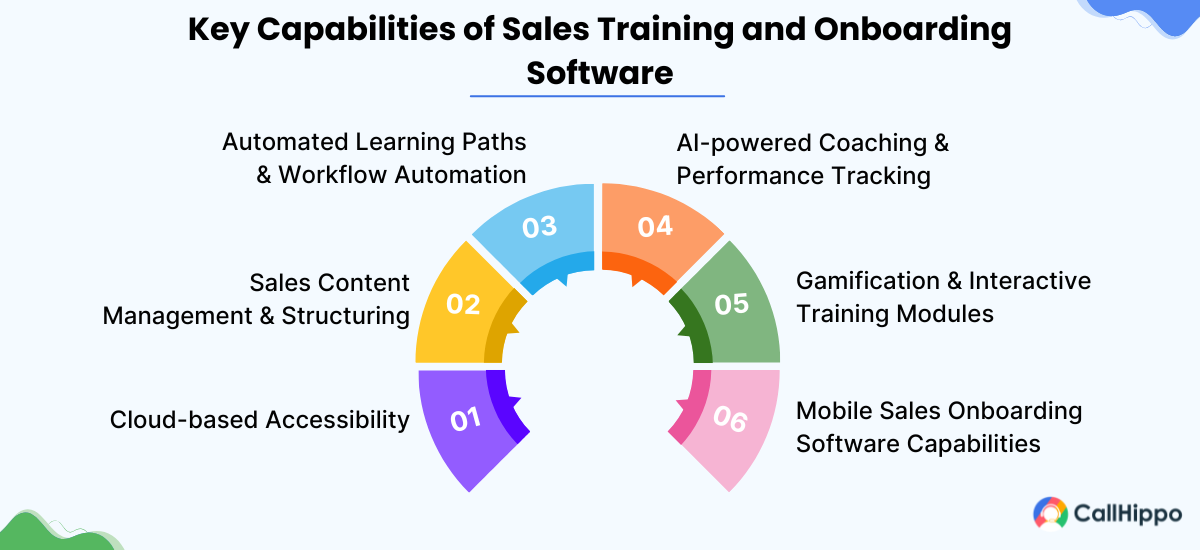
1. Cloud-based Accessibility
An intuitive interface allows new hires to navigate their training easily and without confusion. Thanks to cloud-based accessibility, sales representatives can log in from any location—be it their home, the office, or while on the field.
Teams can concentrate on learning instead of wrestling with complex software thanks to a straightforward, well-structured dashboard that allows for smooth navigation.
2. Sales Content Management & Structuring
When all necessary sales materials are centralized, onboarding becomes easier. The best platforms enable companies to store, organize, and update sales content—such as presentations, scripts, playbooks, and case studies—ensuring that reps always have access to the most current resources. With a structured content library, training can be consistent and free of outdated information.
3. Automated Learning Paths & Workflow Automation
Predefined learning paths help standardize training by automatically guiding new reps through courses, quizzes, and simulations. Workflow automation streamlines onboarding by assigning modules based on role, experience level, or past performance. This ensures reps get the right training at the right time without manual intervention.
4. AI-powered Coaching & Performance Tracking
Insights powered by AI judge a representative’s growth and suggest specific learning modules that take into account their strengths and weaknesses.
Tools for tracking performance offer managers comprehensive reports on engagement levels, completion rates, and mastery of skills. This assists companies in fine-tuning their training strategies and providing targeted coaching to assist reps who are having difficulties.
5. Gamification & Interactive Training Modules
Sales representatives stay motivated and engaged in their training through gamified features such as leaderboards, rewards, and badges. Learning becomes more dynamic and fosters improved knowledge retention and practical skill application through interactive modules like real-life sales simulations, quizzes, and video role-playing exercises.
6. Mobile Sales Onboarding Software Capabilities
Mobile sales onboarding software is designed for remote and field sales teams, enabling reps to access training anytime and anywhere. With mobile-friendly modules, micro-learning lessons, and push notifications, learning extends beyond the desktop environment. Sales professionals who are always on the move find the onboarding process effortless, thanks to this flexibility.
How to Choose the Best Sales Onboarding Platform?
Choosing the right sales onboarding platform is not simply a matter of selecting the most well-liked tool; it involves finding one that aligns with your team’s specific requirements. The appropriate platform ought to facilitate training, increase involvement, and lead to outcomes. Here are the factors to think about before you decide.
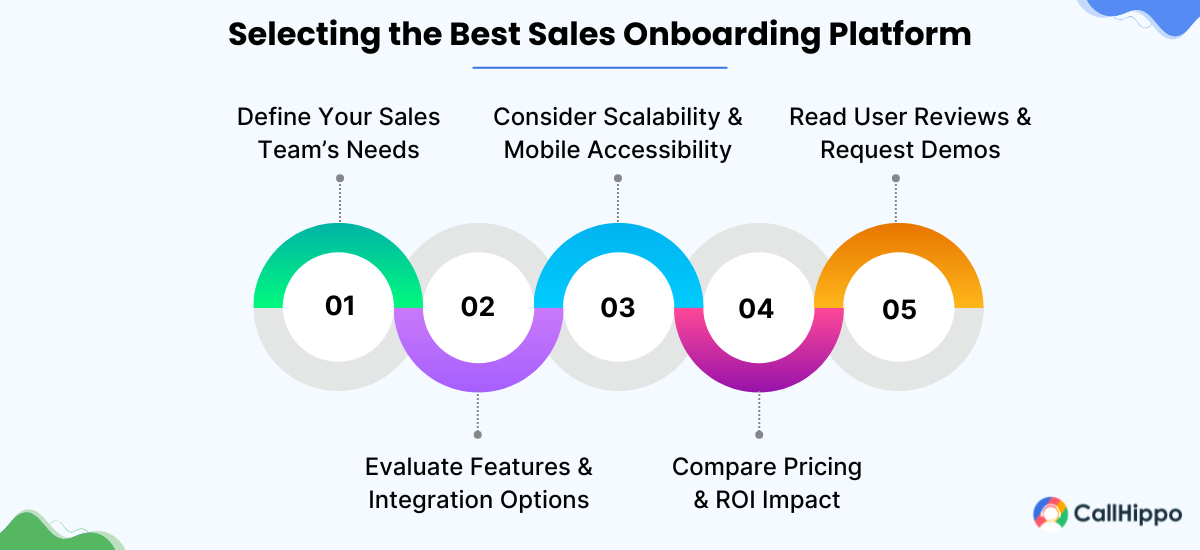
1. Define Your Sales Team’s Needs
Begin with evaluating the size of your team, the levels of experience, and the training challenges. Are you looking for structured learning paths, AI coaching, or gamification? By pinpointing crucial challenges, you can focus on platforms that correspond with your organization’s onboarding objectives and provide new representatives with specific training.
2. Evaluate Features & Integration Options
Seek out key functionalities such as content management, automation, analytics, and interactive training tools. Make certain that the platform works together without friction with your current CRM, LMS, and communication tools. A well-integrated system prevents workflow disruptions and improves overall efficiency in onboarding.
3. Consider Scalability & Mobile Accessibility
Your onboarding software should grow alongside your sales team. Select a platform that grows with your business and facilitates remote teams. Field reps require mobile sales onboarding software to guarantee that they can access training materials at any time and from any location, without restrictions.
4. Compare Pricing & ROI Impact
Although budget is a key consideration, avoid simply opting for the least expensive choice. Assess the return on investment and compare pricing plans. An effective platform should cut down ramp-up time, enhance rep performance, and boost retention—resulting in long-term savings and increased revenue.
5. Read User Reviews & Request Demos
Real user feedback can reveal a platform’s strengths and weaknesses that marketing materials do not highlight. Check online reviews, seek customer testimonials, and ask for a live demonstration. Gaining practical experience allows you to assess whether the platform aligns with your expectations prior to committing.
The Future of Sales Onboarding Tools
The evolution of sales onboarding is rapid, as new technologies are transforming the training and support methods for sales teams. As we progress into 2025 and beyond, sales onboarding tools will keep adding advanced features and will integrate smoothly with other sales systems. Let’s explore the main trends that will influence the future of onboarding tools.
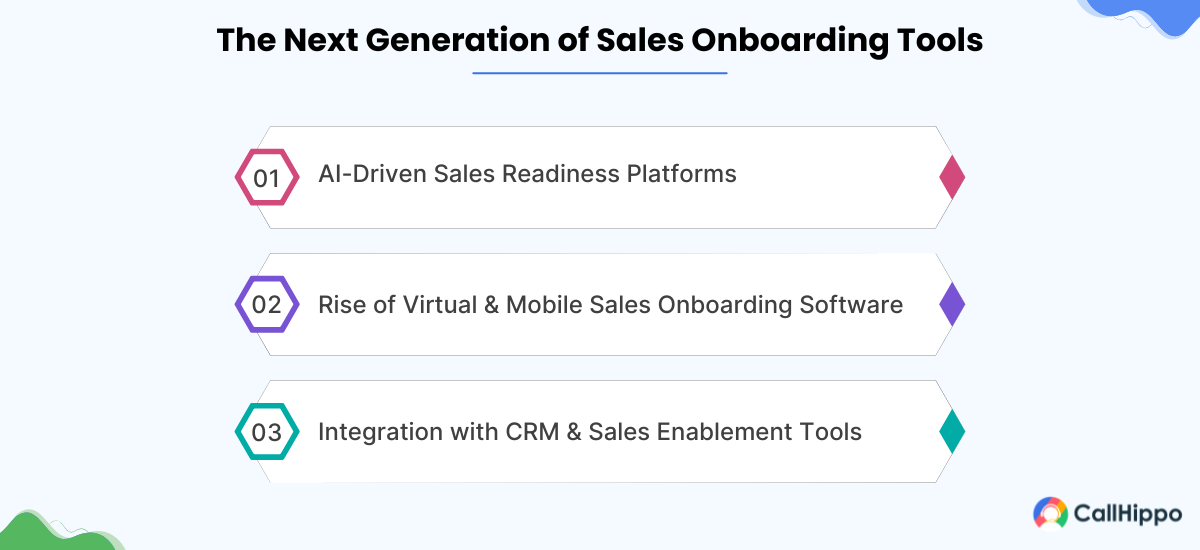
1. AI-Driven Sales Readiness Platforms
AI-driven platforms that tailor training experiences are greatly shaping the future of sales onboarding. AI is capable of real-time analysis of a representative’s performance, proposing personalized learning paths, and providing focused coaching. With this data-driven method, new employees are provided with the necessary support at the right time, which accelerates their journey toward proficiency and enhances overall sales effectiveness.
2. Rise of Virtual & Mobile Sales Onboarding Software
As remote and hybrid work settings become standard, virtual and mobile sales onboarding tools are increasingly necessary. Whether they are on-site or in the field, these platforms provide reps with the ability to access training whenever needed and from any location. With virtual onboarding, sales teams can remain connected and engaged regardless of their location, which provides flexibility and convenience. This makes it easier to scale training across global teams.
3. Integration with CRM & Sales Enablement Tools
In the future, sales onboarding will be more closely linked with CRM and sales enablement tools. When onboarding platforms are synced with these systems, businesses can streamline workflows and ensure that reps receive training on the same tools they will use daily. This alignment enhances efficiency and allows reps to quickly begin engaging with prospects and closing deals seamlessly.
Conclusion
Choosing the right sales onboarding software can make a huge difference in how quickly and effectively new reps get up to speed. A well-structured onboarding process not only boosts confidence but also improves performance and consistency across the team.
The tools listed above offer a range of features, from AI-driven insights to interactive training, helping businesses build stronger sales teams. Investing in the right platform saves time, enhances productivity, and ultimately leads to better sales results.
FAQs
1. What is the best sales onboarding platform for remote teams?
Platforms like SalesBlink and Docebo are ideal for remote teams, offering cloud-based and mobile-friendly features that ensure flexible, engaging training from anywhere.
2. How do sales onboarding tools improve ramp-up time?
These tools streamline training with automated learning paths, helping new hires gain skills faster and reach full productivity more quickly.
3. How does mobile sales onboarding software support field sales reps?
Mobile sales onboarding software provides field reps with access to training, resources, and updates on-the-go, ensuring they stay prepared while away from the office.

Let’s Stay in Touch
Subscribe to our newsletter & never miss our latest news and promotions.



